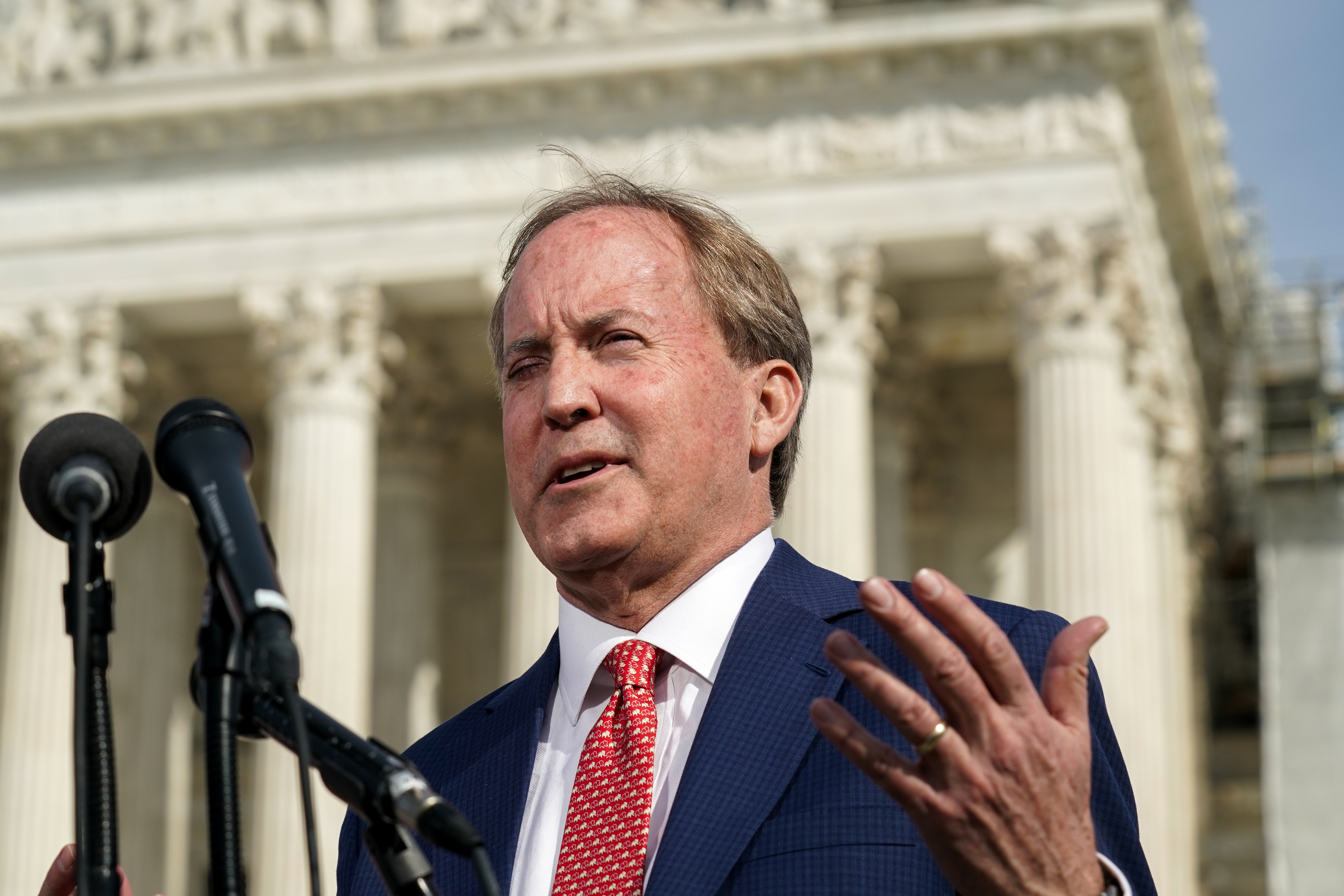LGBTQ organization sues Texas AG over youth transgender records probe

Texas Attorney General Ken Paxton at the Supreme Court in Washington this week. (Jahi Chikwendiu/The Washington Post)
Texas Attorney General Ken Paxton (R) earlier this month demanded records pertaining to the support an LGBTQ+ nonprofit provides to families seeking gender-affirming care for their transgender children—a treatment the state banned last year.
But rather than turning over the information, the group, PFLAG, is now suing Paxton.
The lawsuit—filed Wednesday evening by advocacy groups Lambda Legal, the American Civil Liberties Union and the Transgender Law Center—asks the court to block Paxton’s request, arguing that it amounts to “governmental intimidation” and an attempt to restrict PFLAG members’ “personal freedoms and chill the exercise of their rights.”
“This mean-spirited demand from the Attorney General’s Office is petty and invasive, which is why we want the court to put an end to it,” PFLAG chief executive Brian K. Bond said in a statement.
Paxton’s demands are part of his broader probe into transgender youth receiving gender-affirming care outside the state—even though Texas’s ban on the treatment, which went into effect in September, only applies to in-state providers and doesn’t bar families from seeking care elsewhere. Still, over the past months, Paxton’s office has sought medical records from providers in at least two states: Washington and Georgia, The Washington Post reported.
In a statement, Paxton’s office said his investigation is looking at medical providers possibly “committing insurance fraud as part of a scheme to evade the law, such as by prescribing hormones for a pretextual medical diagnosis unrelated to gender transition.”
“Any organization seeking to violate this law, commit fraud, or weaponize science and medicine against children will be held accountable,” Paxton said in a statement.
But critics have decried Paxton’s information requests as government overreach, arguing that they threaten patients’ medical privacy. And, attorneys for PFLAG warned in the lawsuit, they could induce fear in families seeking a treatment the American Academy of Pediatrics has called “medically necessary and appropriate” for some minors.
“This is just another cruel attempt to circumvent the legal system and target families and friends who support transgender people,” said Lynly Egyes, legal director at Transgender Law Center. “Our communities will not be intimidated by the cruel machinations of out-of-touch politicians.”
According to the civil investigative demand letter sent to PFLAG on Feb. 9, Paxton’s office said “the division believes you are in possession, custody or control of documentary material relevant to the subject matter of an investigation of actual or possible violation” of the Texas Deceptive Trade Practices-Consumer Protection Act, a 1973 state law that allows victims of false, deceptive or misleading business practices to sue for damages.
Specifically, Paxton’s office said it was seeking documents that corroborate the “contingency plans,” “alternative avenues” and “affirming general practitioners” the group’s chief executive alluded to in his affidavit from July.
That month, Bond filed a sworn statement as part of the group’s court case against S.B. 14, the law that prohibits minors from receiving gender-affirming care. In it, he detailed how the law had sent ripples of fear across Texas—where members’ requests for mental health resources “skyrocketed” and families were left scrambling to find alternative care for their children.
“New families showed up in droves for chapter meetings and support groups, seeking information and support,” Bond wrote. “ … PFLAG families with transgender and nonbinary adolescents shared their contingency plans—those with the resources to move or seek out-of-state care have begun firming up their plans to do so, while the vast majority without those resources have been asking chapters for alternative avenues to maintain care in Texas.”
Paxton’s demand letters request communications and chapter meeting minutes related to Bond’s affidavit, as well “all recommendations, referrals, and/or lists of pediatric and/or ‘health care providers’ in Texas that PFLAG (or any of its representatives) has created, maintained, received or distributed since March 8, 2023.”
In its lawsuit, however, PFLAG accuses Paxton of using these demands as a means to “circumvent the normal” process for presenting evidence in the group’s two other ongoing lawsuits against the state: Loe v. Texas, which seeks to block Texas’s gender-affirming care ban, and PFLAG v. Abbott, which aims to prevent the state’s agencies from investigating the treatment’s use as child abuse.
The move, Lambda Legal senior counsel Karen Loewy said, “smacks of retaliation against PFLAG National for standing up for those families against the State’s persecution.”
Paxton’s time in office has been marked by efforts to restrict gender-affirming care for minors. In 2022, he issued a nonbinding legal opinion declaring that the treatment “can legally constitute child abuse under several provisions” of state law. As a result, Gov. Greg Abbott directed state agencies to conduct “prompt and thorough” investigations—some of which led to a minor’s suicide attempt and a family grappling with incessant heckling, according to a lawsuit.
In June 2022, PFLAG—which has 18 chapters in Texas—filed a lawsuit asking the court to prohibit state agencies from investigating its members. Though a judge ordered an injunction three months later, Paxton immediately appealed the decision, which remains in effect after the Court of Appeals issued a similar order.
Last year, a judge sided with PFLAG in temporarily putting Texas’s ban on gender-affirming care for minors on hold. But Paxton appealed the injunction, allowing the law to go into effect in September. The case is now awaiting a decision from the state’s Supreme Court.
Paxton has also investigated pharmaceutical companies that produce puberty blockers for alleged deceptive trade practices, and demanded records showing which drivers changed their gender on their Texas licenses.
Next week, Texas Health and Human Services will implement a new rule prohibiting adults diagnosed with gender dysphoria from receiving Medicaid coverage for “hormonal therapy agents.”
Molly Hennessy-Fiske contributed to this report.



